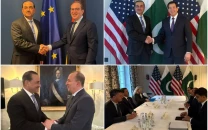Rising debt, low revenue ‘national security’ issue: PM
Premier launches FBR’s track and trace system for sugar industry
Prime Minister Imran Khan on Tuesday noted that the rising foreign debt and low tax revenue had become an issue of “national security” because government did not have enough resources to spend on people’s welfare.
He also maintained that the country's very sustainability was at stake because of the absence of a "tax culture" and hoped that the use of technology would take revenue collection to Rs8 trillion per year.
LIVE #APPNews: Prime Minister Imran Khan addressing inaugural ceremony of Track & Trace System (TTS) of FBR for sugar industry #Islamabad @PakPMO @ImranKhanPTI https://t.co/A8rNyycB6P
— APP 🇵🇰 (@appcsocialmedia) November 23, 2021
“Our biggest problem is that we don’t have enough money to run our country due to which we have to borrow loans,” he said while addressing the inaugural ceremony of the first-ever track and trace system (TTS) of the Federal Board of Revenue (FBR) for the sugar industry in Islamabad.
The FBR's TTS will ensure electronic monitoring of the production and sale of important sectors including tobacco, fertiliser, sugar and cement.
This will help bring transparency in the system and enhance the country's revenue.
Under the system, no production bag of sugar will be taken out from the factory and manufacturing plant without a stamp and an individual identity mark.
In the next phase, the FBR is planning to introduce the track and trace system in petroleum and beverages sectors.
Also read: Foreign loans swell 18% in Jul-Oct
PM Imran, while appreciating the FBR for introducing the TTS, said that the system would have “far-reaching” impact on the tax collection of the country.
Citing examples from Western countries, the premier said tax-to-GDP ratio in Scandinavian countries was around 50%.
He maintained that contrary to the aristocratic lifestyle of the ruling elite in our country, ministers in the West including the UK, which generated 50 times more revenue than Pakistan, if they ever indulged in high expenditures were reminded that they were using public money.
“When ministers in UK – a country of 60 million people and having 50 times more income than Pakistan – travel abroad, they use economy class if the flight time is less than five hours,” he noted.
“Against the practice of Pakistani leaders in the past who used to spend ten times extra public money on foreign trips, the prime minister of UK preferred to stay in the UK embassy in the US to save his country’s tax money.
“But in Pakistan, unfortunately the tax culture was never developed,” he said, adding that the ruling elite of the country never took measures to encourage people to pay taxes.
The premier was of the view that the country could only overcome the “vicious cycle” of debt by paying taxes.
Terming Pakistanis one of the most generous nations in the world, PM Imran said people would start paying taxes when they are assured that their money would not be misused by the rulers.
Earlier, Finance Adviser Shaukat Tarin in his remarks on the occasion said that with the current figure of three million active taxpayers, of which only one million originally paid taxes, work was in progress for the broadening of tax-net by up to 15 million with the use of technology in cooperation with the National Database and Registration Authority (NADRA).
Besides, he said, in the retail sector, FBR machines were being installed at various points across the country to capture the true potential of sales tax. He, however, made it clear that small traders will be placed in fixed tax category.
(With input from APP)



















COMMENTS
Comments are moderated and generally will be posted if they are on-topic and not abusive.
For more information, please see our Comments FAQ